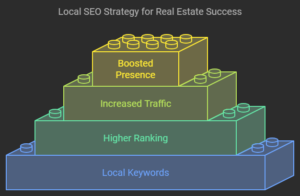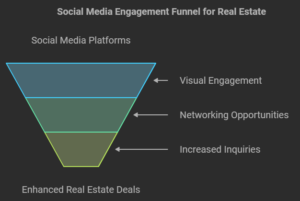
These are digital marketing abilities that will attract more deals to real estate investors, whose business they will use. The lead attraction will be through a professional website showing their investment opportunities, services, and case studies. A local SEO-optimized website positions the investor close to clients’ minds when they need a particular service. Through social media, such as Facebook, Instagram, and LinkedIn, properties can be highlighted and shared with others, thus gathering leads.
Email marketing allows investors to nurture relationships, sending targeted offers and property updates to a segmented audience. Paid advertising, including PPC campaigns, gets a quick appearance in search and on social media. Blogs and market insights help create authority and build trust with potential clients. Online real estate platforms can also be engaged in and get quality leads by utilizing retargeting ads. With these digital strategies, real estate investors can seek and find more deals. This allows them to compete with many other investors in the market.
Building an Informative and Attractive Website
A professional website is essentially the bedrock for real estate investors for the presentation of investment opportunities, services, and case studies of successful implementations. It acts as a centralized platform through which prospective clients learn more about the investor’s track record, available properties, and investment strategies. Such a site with a user-friendly interface encourages users to stay on for longer and explore more.

This feature enables interested parties to simply browse available opportunities, as high-quality images and descriptions of detailed property listings facilitate the viewing process. The contact information of the seller or buyer should be available and some educative content such as blog posts guides or video tutorials may enhance the value placed on the investor’s position in the sector. This will attract and retain the right kinds of visitors if it has features on market trends, property valuation, and investment tips. By integrating all these dimensions, a website can convert the visitor to a lead and, at the same time, contribute to the long-run growth of a business.
Search Engine Optimization (SEO) for Local Visibility
One reason SEO is important for a real estate investor is so that he can boost his localized presence in a manner that will put him out there, where people can contact him to buy or sell properties. The form in which one optimizes their website, using local keywords such as the city or neighborhood name, will have their web pages coming out when such a client searches through the search engines to find properties within his locality. For instance, if the keyword phrase you are targeting is something like “investing in real estate in [city]” or “sell your property in [neighborhood], it will add your website to a higher rank for local searches and increase organic traffic.

Optimize your Google My Business listing, encourage customer reviews, and ensure that your business is present on the local maps and directory listings of Google. The more you are visible on the local search results, the better chances you will have to attract motivated sellers and buyers in your region. By using location-specific keywords in a blog post, property listing, or land page, you will be able to reach local target markets, increase engagement, and get quality leads for new deals.
Using Social Media for Networking and Lead Generation
I also learned that social media, such as Facebook, Instagram, and LinkedIn, can be the best connectors to the potential seller and buyer for a real estate investor. Facebook and Instagram offer opportunities through high-quality images, virtual tours, and live videos to involve local people in getting more inquiries about a property. Facebook Groups and LinkedIn will similarly give an opportunity to be able to network and get in touch with other professionals, buyers, and sellers in the real estate market.

Investors will gain credibility by sharing market updates, success stories, and client testimonials, and also giving investment tips. Posting regularly on the most recent property deals, tips for first-time buyers, and market trends brings on new followers and keep the current audiences engaged. Paid social media ads target particular demographics or geographic areas, leading from that straight to the source of investment opportunities. Of course, the importance of content in growing a loyal following among investors translates into valuable leads and future deals.
Email Marketing for Nurturing Leads and Staying Top-of-Mind
Email marketing can be a very powerful tool for real estate investors when nurturing leads and keeping them top-of-mind of potential clients. The building of an email list further segmented and targeted at the right audience is hence more important when targeting the right message to the right audience. Website sign-ups, property inquiries, and social media engagements allow investors to collect email addresses to build segmented lists based on location, buyer preferences, or investment interests. Segmentation thereby enables investors to place the most relevant emails in front of each group.

Personalized email campaigns really drive quality leads. Targeted offers, property updates, and market news are received by the recipients as the right message at the right time based on their interests. This may trigger the action immediately for a buyer who receives a listing in the specific neighborhood he or she has chosen to invest in. Exclusive deals or even educational content in an email also fuels trust and encourages constant engagement. Value-for-money communication will keep the investor’s name in the inbox at any one time, making them the go-to contact at any prospective investment or selling time.
Pay-per-click (PPC) Advertising for Quick Results
Pay-per-click advertising is the most effective way for a real estate investor to get immediate results and quality leads. Being able to target precisely through Google Ads or even social media ads allows you to talk to motivated property sellers or property buyers who are actively looking for real estate solutions. Google Ads allows the investor to bid on related keywords, such as “sell a house fast,” or “buy a rental property in [city],” so his website appears when potential clients search for such terms.

Social media: Similarly, the other good news is that Facebook, Instagram, and LinkedIn offer robust targeting options. Users can thus create ads that target investors who are interested in their location, age, interest, and behavior; therefore, this helps reach the local property seller effectively and effectively. Geo-targeting is thus a key application of PPC campaigns in that the Ads hit the appropriate audience in specific geographic areas. Geo-targeting helps investors optimize their budget by attracting leads from their desired market.
You will set up well-structured PPC campaigns with clarity on goals, interesting ad copy, and how important calls to action will drive traffic, increase visibility, and generate high-quality leads quickly. This is one strategy that ensures faster results and keeps the investors competitive.
Content Marketing and Blogging to Establish Authority
Content marketing and blogging are probably the most influential tools for a real estate investor to gain authority in the field and attract would-be clients. Valuable market insights, investment tips, and guides on properties make an investor a trusted and relied-upon expert. Blog posts that are relevant to “How to Evaluate Investment Properties” or “The Best Neighborhoods for Real Estate Investment” give useful information to potential buyers and sellers when making such decisions.

Educational content easily earns the trust of the audience. It helps in giving solutions to frequently asked questions or common problems, thus proving to others that you are an expert and reliable in what you say. Beyond the blog posts, downloadable guides, e-books, or checklists contribute even further to value for the audience, making your viewers come back to your website time and again.
Using value-driven content that is consistent helps investors stay top-of-mind with their audience and will improve SEO rankings. Value-driven content attracts organic traffic, and the visitors then become leads over time. Since you’re able to provide value to people by helping them make the right decision, by sharing useful information and advice, your audience will trust you when it is a real need to buy, sell, or invest.
Leveraging Online Real Estate Platforms
The other critical platform for real estate investors, in that regard, to utilize in capitalizing on their online presence is those online real estate platforms: Zillow, Realtor.com, and Redfin. Through these channels, the investor is enabled to sift through listings of properties, to scrutinize a specific location, price, or type of property, and eventually identify potential investment properties that meet the criteria. Many of these also give them analytical tools on market trends, monitor changes in property value over time, and set up alerts for new listings so no investor will ever miss any possible investment opportunity.

Investors can filter to set up automatic alerts for listings on such portals that match their investment goals. Constant checking of listings, contacting the sellers directly, and quick response to inquiries help build rapport with potential sellers. Creating a rich profile complete with business information and stories of success will portray an element of credibility in such platforms and fetch more leads.
Retargeting and Remarketing Strategies
Retargeting and remarketing are strong tools that real estate investors may leverage when visitors have previously shown an interest in either property or service but did not convert into action directly. Retargeting ads work through cookies that track site visitors. The visitor is then shown targeted ads based on the other websites or social media portals they access. This will keep your properties or services in front of prospects and remind them of what they have previously looked at to close the deal, either scheduling a showing or making an inquiry.

Retargeting ads help investors reach out to people who visited listings for properties filled out their contact forms or otherwise interacted with investors’ websites. Such ads work better because they are addressed to a warm audience that has shown interest, which gives a high chance of conversion.
Conclusion
To acquire more deals and grow their business, real estate investors require digital marketing strategies. A professional website, SEO, social media marketing, and email campaigns are some of the tools through which investors can reach and engage potential sellers and buyers, thereby attracting them to their business. Listings offered by platforms like Zillow and Redfin present a lot of benefits, whereas retargeting ads further provide an increase in conversion rates as they bring interested visitors back.
Authoritative positioning can result from the content marketing campaigns of blogs and guides, while paid advertising in Google and in the social media medium will ensure quick visibility for the firm and reach the target audience. These methods not only bring more leads into the system but also help build trust with potential clients critical factor in the real estate market.
